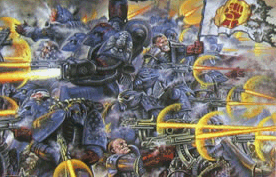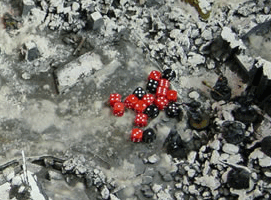
MTGS Mini is the format we'll be relying on for the next two weeks. People don't like to write much during the holidays, and as a result sites like mtg.com and... well... ours end up with less material for the front page. However, instead of giving you two weeks of MTGS Classics, you'll see two weeks of MTGS Mini, a far more easygoing format. So sit back and relax while we relax... our standards. If this isn't your thing, take a break and we'll see you in January!
I sometimes wish Magic had been around when I was a kid. Not that I was short of things to do back in the day. Summer of 1990, before anyone was turning cardboard sideways, we were all blowing things up. The game in this case was Games Workshop's Warhammer 40000. My goal for the Summer: to win the World Championship at Games Day.
Now before anyone gets the idea that this was anything like the Magic World Championship... no, not at all. The competition worked in two stages: to reach the finals you had to win the league played in your region. That accomplished, you received an invitation to the finals. There were only about 50 regions or so, all but a few being in the UK. Nor were the regional contests particularly tough, since so many players had only a weak understanding of the strategy of the games.
This year was no exception. One of my regional qualifying matches I won with more than 80% of my troops still in play. Which is as ridiculous as it sounds and should never happen. Indeed, I also qualified for the championships of another of GW's games the same year (Blood Bowl) despite having done almost no testing and having no special talent for the game. I passed the invite to someone else.

Can't have too much shooty goodness!
Still, Warhammer 40000 like most tabletop wargames used dice. This meant you could roll badly at a critical moment and lose. So a lot like manascrew then.
There was nowhere near enough time to play swiss-style games or even a knockout tournament. So the way GW set things up was that the players were grouped randomly into sixes and then fought free-for-all combats with only the top two (in terms of kills, not survival) going through to the next round. This was a very weak system, since the terrain layouts couldn't be made perfectly fair. And in fact, they were even worse than they might have been.
The first round went terribly for me. Half of my squad was destroyed before the start of my second turn since one of the other players began with line of sight to my position. My resulting lack of firepower was a major problem. I finished third of my group - knocked out of the tournament already.
...or maybe not. GW needed two more players to make up numbers for the second round. As one of the highest scoring losers I was shifted back in. This time, the unfair bias was in my favour and I won the group easily from a superb fortified position which... I'd started in.
The semifinals were still not one on one. The six remaining players were to battle on a single table, with the top two moving to a one on one final. This game was actually quite tight, but with time ticking away it was clear it wouldn't be decided by the long term strategies we'd chosen, but by the arbitrary turn limit the ref had announced halfway through (!).
With one turn to play, I was quite a few kills short. One of my opponents had bunched all his troops up to stay out of line of sight... but he knew he was safe. Nobody could move to line of sight of his position within the one turn remaining and still fire. Then I saw my opportunity. I attacked the building between us with almost everything I had, passing up the chance to fire at the snipers actually attacking me. With the last grenade the building fell and I fired my Distortion Cannon into the centre of the packed squad for the win.
What's this got to do with Magic? You'll see in a minute.
The one-on-one finals begin. My opponent is some guy called Dave who, flatteringly, recognises me as the winner of the Adeptus Titanicus tournament the previous year. His play is razor sharp. He understands the map and knows exactly what he needs to do to contain my assault. Play continues as we slowly apply pressure to each other's positions. Then I see a window of opportunity to play for the win.

Strange polyhedral enemies lurk in the rubble.
Dave peers down at the board. "Ugh. I hope not," he winces, "but to be honest I'm not sure either way." I wasn't sure either. We called over the ref and explained the situation.
"No problem," the ref grins. He picks up the D-Cannon marine and points it towards the target.
Dave and I are both stunned. We just look at each other in astonishment for a full ten seconds, blinking slightly. I explain to the ref what he just did and he shrugs and says "Well, whatever, you can fire it next turn".
In the end Dave and I decided that since the match might hinge on this shot we'd roll a die. On a roll of 1-3 my marine would be ruled eligible to fire. On a 4-6, he would be ruled out of arc. I rolled a 5.
Some months later when I was still moaning about this incident, a friend of mine suggested that I just roll the shot anyway to see if it would have hit. I rolled a 1. So as it turns out I wouldn't have won anyway.
These days, Magic players have tournaments which actually award money as prizes. The World Championship actually involves most of the world... but the real reason I'm always a bit jealous of young gamers growing up with Magic is all about the judges. Magic judges are so skilled at what they do that it almost defies belief compared to the games I used to play. You wouldn't see the finals of the Magic World Championship messed up by a judge pulling a Volcanic Hammer out of a player's hand, flipping it onto the table and pointing out they could play it as an Instant for the win. Sometimes they even pay attention to games instead of facing the opposite direction and chatting to their mates about motorbikes.
So this Christmas I'd like to propose a toast: To Magic's judges! Long may they continue to not suck.
Comments